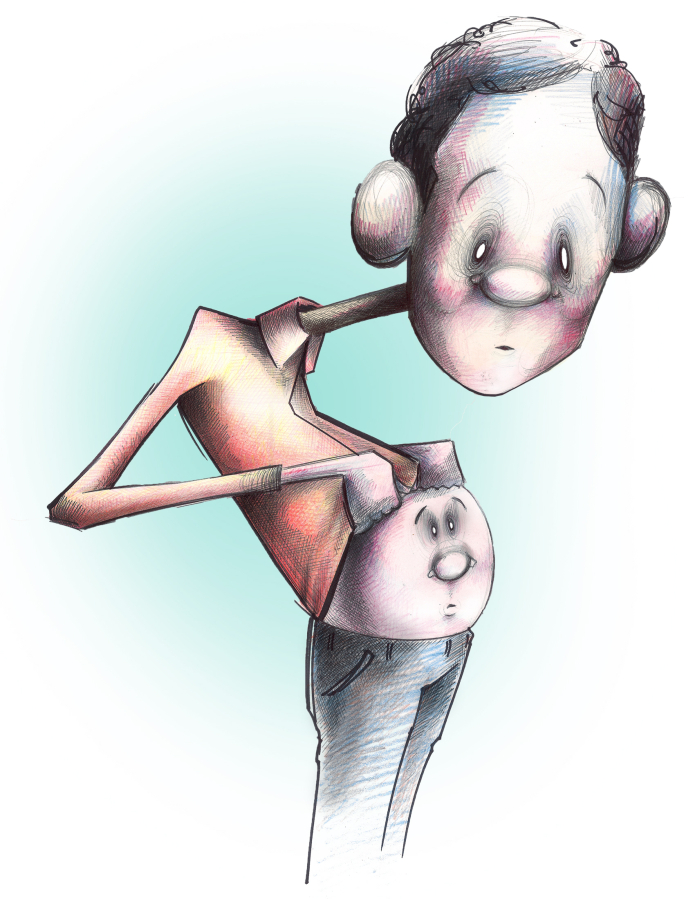In the dark, oxygen-free zone of our large intestines, a vast community of life is flourishing. Scientists say there are more than 100 trillion microbes living there, and if you gathered them all together, they would weigh more than our brains.
In his new book, “The Mind-Gut Connection,” Dr. Emeran Mayer explains how these microscopic organisms insert themselves into the running dialogue between the brain and the gut. In the process, he says, they help determine how stressed out we get, when we get sick and how quickly we recover.
Mayer is the director of the UCLA Oppenheimer Family Center for Neurobiology of Stress and the co-director of the CURE: Digestive Diseases Research Center. He has been studying interactions between the gut and the mind for 30 years.
Part of what inspired him to write the book was the lack of concrete information about how the gut microbiome affects our mental state.
“People have written some very speculative and provocative review articles about how microbes might regulate human emotions,” said Mayer, a gastroenterologist. “What I have tried to do is be critical and extract what we know so far and speculate about what this could imply.”
Mayer spoke to the Los Angeles Times about the tiny creatures that may have an outsize influence on our physical and psychological health.
What’s so special about the gut?
The gut is a much more complicated system than most people realize. People think it is this machine that processes, transports and absorbs foods. In reality it is an extensive sensory system, signaling system and immune system.
In the book you sometimes refer to the gut as “the little brain.” Why is that?
We have a nervous system sandwiched between the layers of our gut that has between 50 (million) and 100 million nerve cells. It’s about the size of the spinal cord if you pushed it all together.
It has its own intelligence. It wants to get rid of things that don’t belong there — either bacteria, bad bugs or toxins from rotten foods. If you ingest something wrong, it gives the signal to throw it up, and if you have a bad bug in your large intestine, it generates diarrhea. The reason it is so perfect is it has evolved over billions of years. Even the most primitive marine animals had something very similar in principle.
Why are the microbes that live in the gut important?
What we know for sure is that this community plays a major role in processes of digestion, metabolism, gut health and immune defense mechanisms. But my peak interest is the connection between the microbes and the human brain. There have been some very intriguing mouse and rat studies in the last few years that show communication between the microbes and the brain can play quite a big role in the generation of the emotional behaviors of these animals.
Have any of those studies been done in humans?
In adults, surprisingly, there is very limited data to confirm these animal studies. It’s not that there are negative studies, it’s just not enough studies.
How can tiny microbes in the gut communicate with the brain?
There are receptors throughout our bodies that respond to signals from the microbes or the metabolites that they produce. For example, certain microbes can influence the production of the serotonin molecule, which plays a role in appetite regulation, food intake, well-being and sleep. That gives the microbes a tremendous ability to influence overall health states.
Also, some microbe signals can activate the vagus nerve endings in the gut, which are like an information highway to the brain. Many of these effects are seen in animal studies. Researchers manipulated the microbes in the guts of mice and saw different behaviors. But these same behaviors were abolished when they cut the vagus nerve.
I definitely feel emotions in my stomach. For example, when I’m angry, I can feel my stomach clench up. What’s going on?
Every emotional state has a reflection on the gut level. The pattern for an angry stomach is contraction, more acid secretion and an increase in blood flow to allow the stomach to do this extra work.
Are microbes involved?
When we experience these emotions — especially stress and anxiety — there is also a release of stress hormones like adrenaline and norepinephrine. They circulate in the blood and make your heart beat faster and cause sweaty palms. We are learning now that they also influence the behavior of the microbes in your gut because they have receptors for these chemicals.
Animal studies have shown that the release of these chemicals can change the gene expression profile of the bacteria in the gut, causing their virulence genes to be up-regulated.
What is the relationship between gut microbes and depression? Do you think microbes can cause it?
It’s the chicken and the egg question: Do abnormalities in the gut influence the brain or do abnormalities in the brain influence the gut? I’ve seen one study presented that was able to show a change in the behavior of mice that got gut microbes from a depressed person. The mice didn’t act depressed, but there was some alteration in their behavior.
There are still a lot of questions that remain. We are just at the beginning of this, but there are a lot of experiments underway.
What about the relationship between our gut microbes and other diseases?
It is plausible that the microbiota in the gut play a role in initiating diseases such as Parkinson’s, Alzheimer’s and autism, but most of the evidence is really speculative. I think if we have this conversation in five years, then I could say yes or no, this is confirmed, this is not.
The good news is there’s a lot of effort to answer all these questions. Five years ago nobody had ever thought to ask them.



